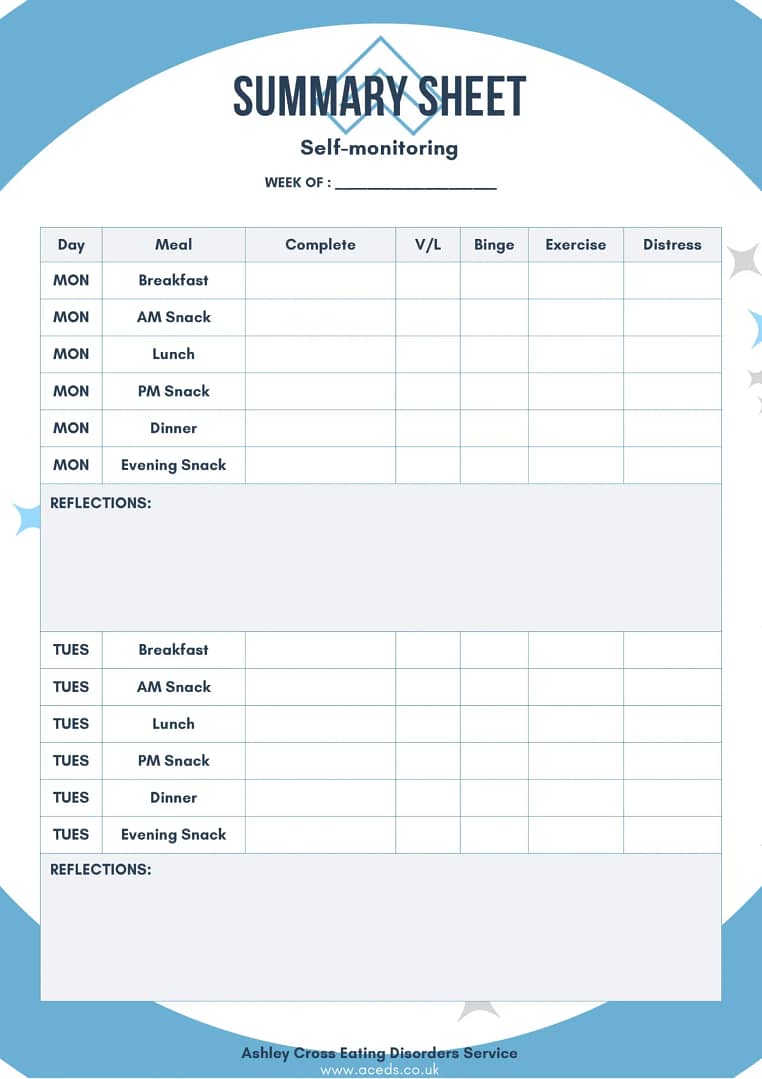Therapy
Evidence-based support to help you overcome your eating disorder
We offer CBT-E, MANTRA, CBT-AR and Family-Based Treatment counselling and psychotherapy to those wanting to overcome with Anorexia, Bulimia and Binge Eating.
Stage 1
Starting Well, where we build a foundation
The initial sessions focus on understanding your unique eating disorder patterns, establishing a strong therapeutic relationship, and setting the stage for change. Here we introduce self-monitoring, to identify eating patterns, thoughts, and triggers that contribute to the eating disorder. Have a look at our free resource here.


Stage 2
The focus shifts to reviewing your progress
We identify any barriers to recovery, such as low self-esteem, extreme perfectionism, and anxiety. This stage is critical for recognizing achievements and addressing challenges.
Working closely with your therapist, you’ll create a personalised plan to overcome these obstacles, using cognitive-behavioural strategies to continue improving yourself. This collaborative effort ensures tailored support to navigate and dismantle the barriers, fostering continued progress towards recovery.
Stage 3
Addressing the maintaining mechanisms
This spans approximately 10 weekly sessions and is tailored to the individual’s specific needs, focusing on three key modules: body image, dietary restraint, and the relationship between events, moods, and eating. These modules target the core processes sustaining the eating disorder.
As the stage progresses, the treatment also prioritises identifying and managing potential setbacks to prevent them from evolving into full relapses, emphasising early detection and intervention to maintain recovery momentum.


Stage 4
Ending Well
This final phase has three main goals: to gradually phase out specific treatment procedures like self-monitoring and in-session weighing; to create a plan ensuring the maintenance of treatment gains; and to develop a strategy for effectively addressing potential future setbacks, equipping patients with the tools to prevent relapses and sustain their recovery long-term.
Family-Based Treatment (FBT)
FBT is a distinguished approach designed for families navigating the complexities of eating disorders. This evidence-based therapy is structured around the powerful concept of family involvement in recovery, unfolding in three carefully designed phases. Each phase aims to progressively empower the family and the affected individual, reinforcing the healing process with support, understanding, and collaboration.
Phase /01
Nutritional Rehabilitation
This initial phase leverages the strength and support of the family unit to create a nurturing environment conducive to the adolescent’s physical recovery. It emphasises the crucial role of family in meal planning and supervision, underscoring the collective effort required to kickstart the healing process. Central to this phase are family meals, which serve as both a support mechanism and a means to re-establish healthy eating patterns.


Phase /02
Transitioning Control of Eating
Transitioning marks a significant shift towards restoring the individuals autonomy over their eating decisions. This delicate balance between support and independence is navigated with care, gradually encouraging the individual to assume more responsibility for their eating choices while still under the watchful eye of their support system. Families are guided to slowly entrust the individual with more control, fostering confidence and self-efficacy in their journey towards recovery.
Phase /03
Establishing Development
The final phase of FBT is future-oriented, focusing on the individuals development beyond the eating disorder. It supports the individual in exploring their identity, interests, and aspirations, marking a shift towards holistic well-being and personal growth. The therapy aids families in encouraging the individuals pursuit of personal goals and interests, facilitating a transition into a healthy and balanced life.

Stage 1
Education and Goal Setting
Together, we’ll explore what ARFID means for you and start painting a picture of a more nourished life. We’ll talk about your unique eating habits, identify what’s been holding you back, and set achievable, inspiring goals. Here we assess nutritional deficiencies, identify factors driving restrictive/avoidant eating, establish treatment goals, and begin establishing a regular eating pattern. If needed, we’ll also address any nutritional gaps to ensure your body gets what it needs to thrive.


Stage 2
Addressing Barriers and Expanding Food Variety
As we move forward, we celebrate every step of progress and tackle any challenges head-on, together. We’ll gently explore new foods, adjusting as we go, making sure each step feels right for you. This stage is all about getting comfortable with small changes and recognising the strengths you already possess.
Stage 3
Exposure to Feared Foods
In therapy you will use exposure techniques to acclimate to new food experiences and increase tolerance, aiming to incorporate a wider range of foods into the diet. This may include increasing volume to support healthy weight. Imagine slowly discovering the joy in new tastes and textures, guided by our supportive team every step of the way. We’ll introduce a variety of foods at your pace, turning what once felt daunting into a journey of discovery and accomplishment.


Stage 4
Relapse Prevention
As we approach the culmination of our journey together, we focus on ensuring you feel empowered and equipped to continue exploring the world of food on your own terms. We’ll craft a personalised plan that not only maintains your progress but also celebrates your new relationship with food.
Psychotherapy provides a safe space for individuals to explore and understand the underlying psychological factors contributing to their eating disorder

Through various therapeutic techniques, such as cognitive-behavioral therapy (CBT), dialectical behavior therapy (DBT), and psychodynamic therapy, individuals can address distorted beliefs, regulate emotions, and develop healthier coping mechanisms.
Psychotherapy promotes self-awareness, resilience, and empowerment, guiding individuals towards sustainable recovery and a renewed sense of well-being.
MANTRA uses integrative therapy and has been developed specifically for the treatment of anorexia nervosa

*Maudsley Anorexia Nervosa Treatment for Adults
Flexible and Personalised: MANTRA adapts to the individual, with a flexible session structure ranging from 20-40 sessions.
A Comprehensive Touch: Recognising that AN affects more than just eating behaviours, MANTRA takes a holistic approach. It delves into cognitive, emotional, and relational aspects, as well as biological factors, facilitating a balanced recovery.
Fostering Motivation: Central to MANTRA is the cultivation of motivation for change. The therapy engages individuals in a way that empowers them, igniting hope and the desire to move forward in recovery.
Collaborative Spirit: MANTRA thrives on partnership. It positions therapists and individuals side by side in the treatment process, creating a collaborative environment that encourages active participation in crafting a personal recovery plan.
Beyond Symptoms to Quality of Life: The goal of MANTRA extends beyond managing symptoms; it aims to enhance overall quality of life. The therapy supports individuals in rediscovering joy, meaning, and engagement in life’s activities, contributing to a fulfilling recovery journey.
